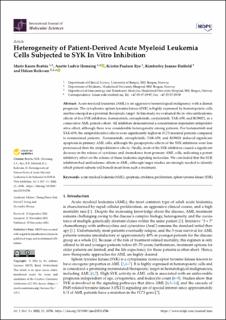Heterogeneity of patient-derived acute myeloid leukemia cells subjected to SYK in vitro inhibition
Brattås, Marte Karen; Hemsing, Anette Lodvir; Rye, Kristin Paulsen; Hatfield, Kimberley Joanne; Reikvam, Håkon
Journal article, Peer reviewed
Published version

Åpne
Permanent lenke
https://hdl.handle.net/11250/3040181Utgivelsesdato
2022Metadata
Vis full innførselSamlinger
- Department of Clinical Science [2318]
- Registrations from Cristin [9791]
Originalversjon
International Journal of Molecular Sciences. 2022, 23 (23), 14706. 10.3390/ijms232314706Sammendrag
Acute myeloid leukemia (AML) is an aggressive hematological malignancy with a dismal prognosis. The cytoplasmic spleen tyrosine kinase (SYK) is highly expressed by hematopoietic cells and has emerged as a potential therapeutic target. In this study, we evaluated the in vitro antileukemic effects of five SYK inhibitors, fostamatinib, entospletinib, cerdulatinib, TAK-659, and RO9021, in a consecutive AML patient cohort. All inhibitors demonstrated a concentration-dependent antiproliferative effect, although there was considerable heterogeneity among patients. For fostamatinib and TAK-659, the antiproliferative effects were significantly higher in FLT3 mutated patients compared to nonmutated patients. Fostamatinib, entospletinib, TAK-659, and RO9021 induced significant apoptosis in primary AML cells, although the proapoptotic effects of the SYK inhibitors were less pronounced than the antiproliferative effects. Finally, most of the SYK inhibitors caused a significant decrease in the release of cytokines and chemokines from primary AML cells, indicating a potent inhibitory effect on the release of these leukemic signaling molecules. We concluded that the SYK inhibitors had antileukemic effects in AML, although larger studies are strongly needed to identify which patient subsets will benefit most from such a treatment.
